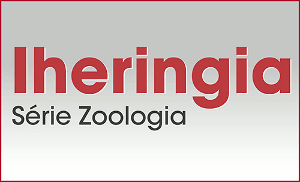We studied the diet of juvenile Trachinotus carolinus (Linnaeus, 1766) in sandy beaches of Sepetiba Bay (Rio de Janeiro, Brazil), between January 2000 and April 2001. We tried to evaluate the trophic plasticity of fish this species along a spatial gradient of wave exposure, seasonality, besides to evaluate ontogenetic changes in the diet. The Index of Relative Importance (IRI) was used to measure the food items, determined by their frequency of occurrence, numbers and weights. The subphylum Crustacea, mainly the order Mysidacea, Decapoda Emerita brasiliensis (Schmitt, 1935) and Cephalochordata, represented by Branchiostoma platae (Fitzinger, 1862) were dominant in the diet. In the most exposed zone (Barra de Guaratiba beach) with predominant sandy substrate, the diet was comprised mainly by Emerita brasiliensis and Cirripedia, this later item common in rocky shores at the beach edge; in the intermediate exposed beach (Muriqui beach), Mysidacea and Branchiostoma platae; in the most protected beach (Itacuruçá beach), Polychaeta, Mysidacea and Branchiostoma platae was predominant. No seasonal change was recorded for the use of Mysidacea, while Branchiostoma platae was the more consumed during the winter, Polychaeta in spring, Cirripedia and Emerita brasiliensis, in summer. Mysidacea was the predominate food in all size classes, while Polychaeta was used predominantly by fish smaller than 20 mm standard length (SL) and Emerita brasiliensis and Cirripedia, were consumed mainly by larger individuals than 40 mm in the most exposed beach only. The success in use of surf zones and sand beaches by this fishes species, it can be partly, due the opportunist trophic strategy that uses a wide variety of available resources on environmental.
Feeding index; pompano; marine fishes; trophic ontogeny; surf zone

 Diet of juvenile Trachinotus carolinus (Actinopterygii, Carangidae) in sandy beaches on coast of Rio de Janeiro, Brazil
Diet of juvenile Trachinotus carolinus (Actinopterygii, Carangidae) in sandy beaches on coast of Rio de Janeiro, Brazil



